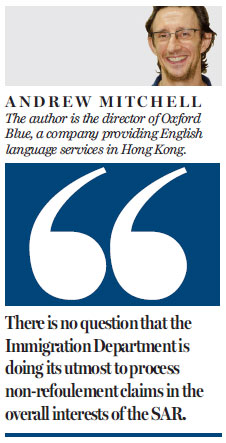Greater transparency is needed during the screening of refugees
Updated: 2015-12-23 09:17
By Andrew Mitchell(HK Edition)
|
|||||||
Editor's note: This is the second in a two-part series discussing issues surrounding refugees in Hong Kong.
Hong Kong has a long history of dealing with refugees. In fact, many of the people who contributed to the city's economic miracle after World War II were originally refugees. However it is only recently, following a ruling by the Court of Final Appeal in March 2013, that the Immigration Department has taken over responsibility for processing persecution claims here. Prior to this the main responsibility lay with the Office of the United Nations High Commissioner for Refugees (UNHCR).
Under the new system, introduced in March 2014, the SAR government processes all claims for asylum - including those for torture and cruel, inhuman or degrading treatment or punishment (CIDTP) under a Unified Screening Mechanism (USM). The claims are collectively referred to as "non-refoulement" claims.
Some 18 months on from the introduction of USM, the statistics make for interesting reading. When the new system came into operation, there were 6,699 non-refoulement claims pending. By the end of September only 2,602 of them had been determined, with 1,918 withdrawn and some 2,179 still pending. Meanwhile, a further 8,271 claims had been received, bringing the total number of claims pending to 10,450.
Clearly something needs to be done to speed up the screening system, as for every claim processed under USM so far nearly two new claims have been received. As a result, thousands of asylum seekers now face the prospect of being stuck in Hong Kong for several years as they wait for their claims to be processed.
During the processing period the claimants are not allowed to work, so they are dependent on government assistance in the form of a monthly rent allowance of HK$1,500 and a monthly food allowance of HK$1,200. Since the allowances are woefully inadequate, the claimants are also dependent on the assistance provided by a number of charities serving the needs of refugees here.
Reduced to a life of poverty and dependence, many asylum seekers struggle with psychological problems. Unable to work and unable to leave, they find themselves in limbo as they wait for the outcome of their asylum claims, never really knowing how long the process will actually take.
All this misery comes at great expense to the government as well. At the end of October it had already exceeded its budget of HK$640 million for the whole financial year. Some HK$329 million of this was spent on humanitarian assistance to claimants, so speeding up the screening system will save the government a significant amount of money.
However, the Immigration Department needs to make sure that any streamlining of USM does not erode the overall fairness of the system, especially as this has already been called into question as a result of the extremely low number of successful claimants. As of the end of September, of the 2,602 claims determined under USM only 12 had been substantiated. This represents a substantiation rate of less than 0.5 percent, compared with a figure of anything between 20 and 50 percent for other developed societies.
The obvious concern here is that some of the unsuccessful claimants might face torture or CIDTP on returning to their home countries (at the time of writing over 70 percent of the claimants are still in Hong Kong, lodging appeals with the Torture Claims Appeal Board). Should that happen, Hong Kong would find itself in breach of its obligations under the 1992 United Nations Convention against Torture.
Obviously the government denies any such possibility, pointing to the procedures in place and the support available to claimants under USM. However, refugee concern groups insist that an "effective 0-percent recognition rate" is a statistical impossibility.
What is urgently needed here is more transparency. The Immigration Department does not publish statistics of its own accord (the figures quoted in this article are taken from responses given by Secretary for Security Lai Tung-kwok to questions tabled in the Legislative Council). Moreover, it does not allow third parties to comment on the grounds on which judgments about individual claims are made, even when these claims involve people from areas with a high level of conflict.
There is no question that the Immigration Department is doing its utmost to process non-refoulement claims in the overall interests of the SAR. Introducing more transparency into the system, therefore, would be a good thing not only for the claimants but also for the authorities. In providing details of the various successful and unsuccessful claims, the government would also be able to highlight any abuses of the new system.

(HK Edition 12/23/2015 page9)